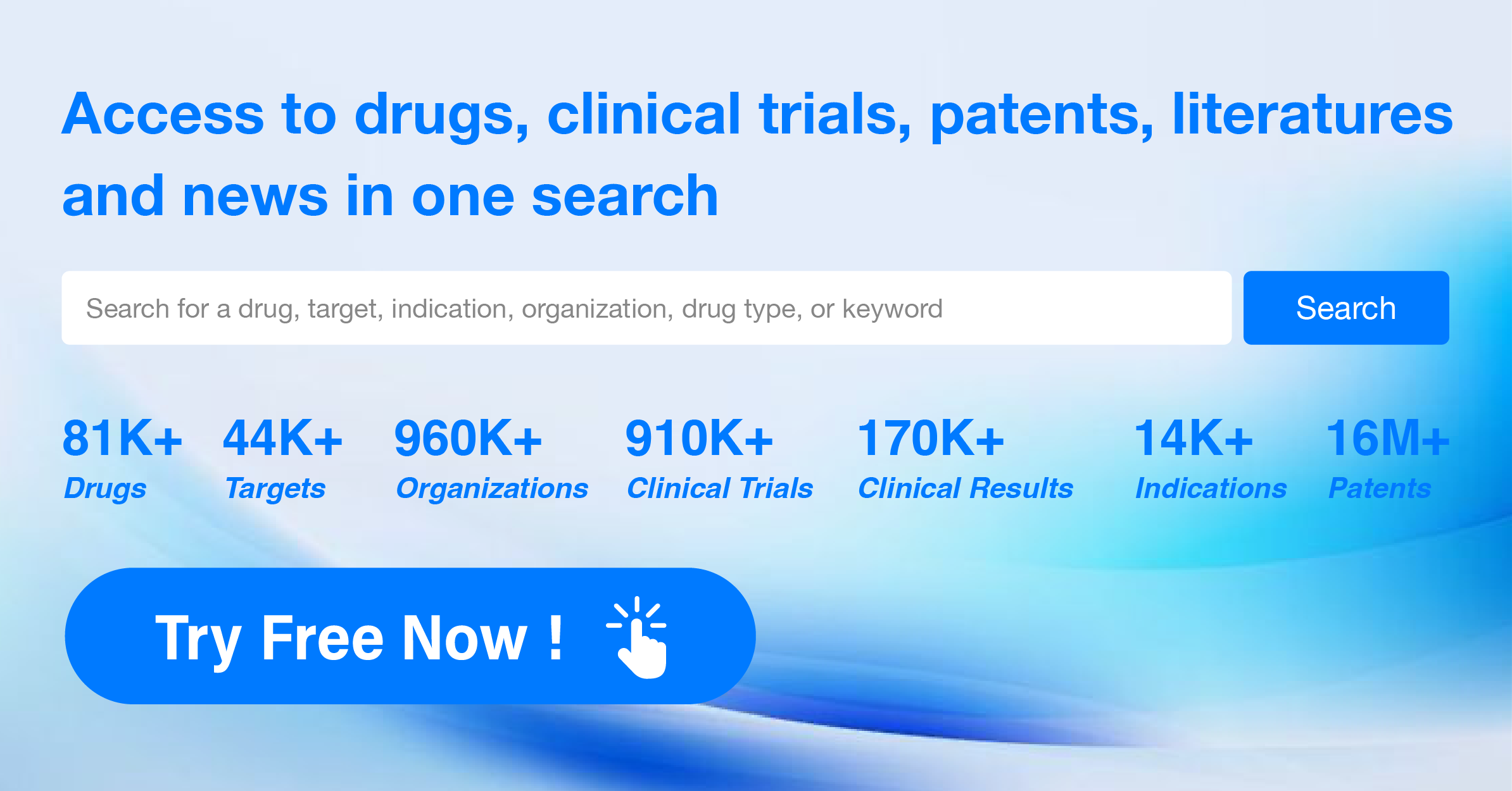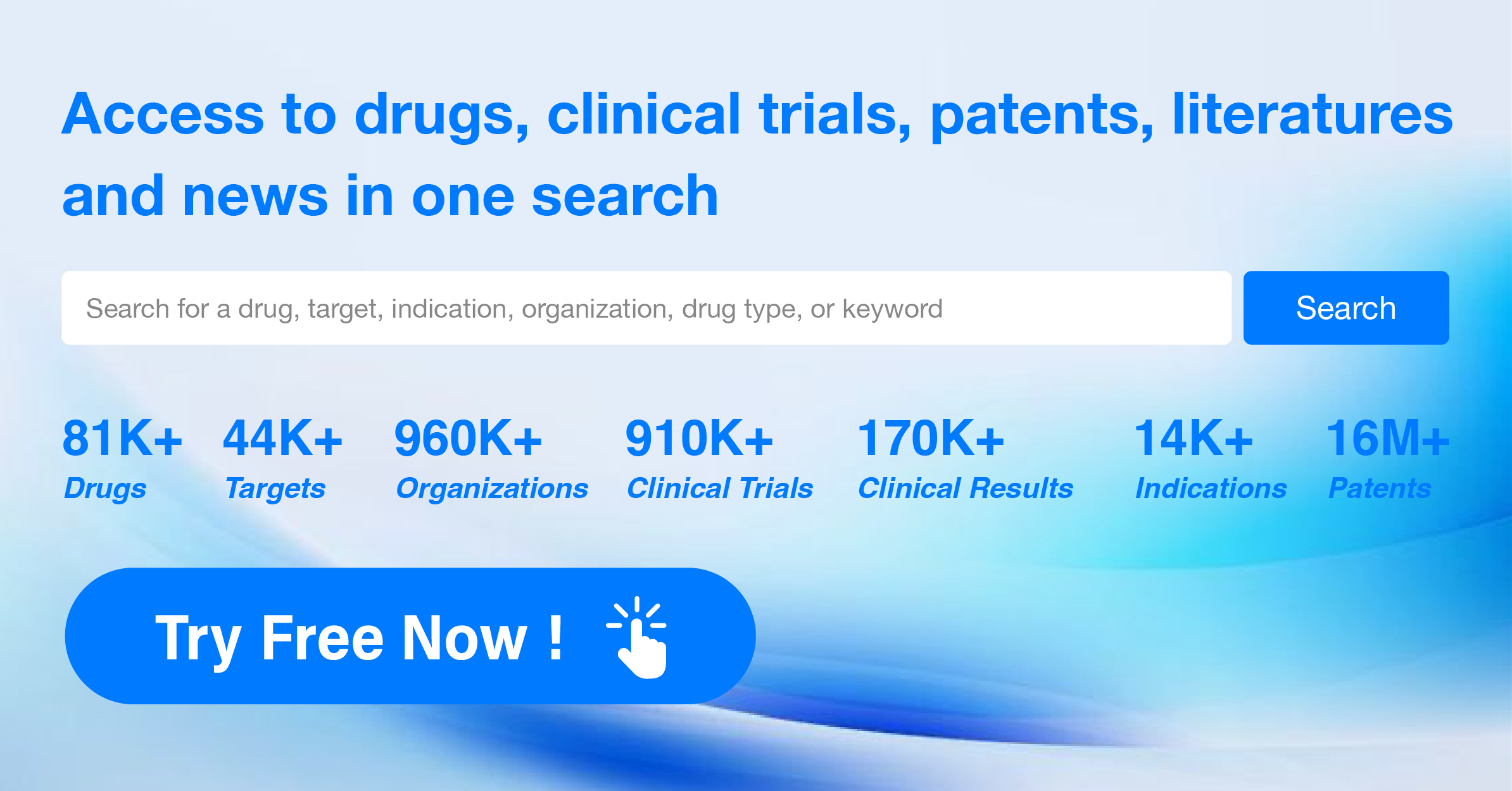Global New Drug Research and Development Progress Weekly Report(4.15-4.21)
Global Pharmaceutical Research and Development Progress
1.Ocumension's postoperative inflammation new drug OT-502 achieves success in China's Phase III study, set to file for market approval
On April 15, Ocumension Therapeutics announced that its novel treatment for postoperative inflammation, OT-502 (DEXYCU, dexamethasone insert), has successfully met the primary efficacy endpoints of its Phase III clinical trial in China. OT-502 (dexamethasone insert) is a new, biodegradable, single-dose, slow-release anti-inflammatory medication that begins to release the active ingredient dexamethasone immediately after injection to exert its anti-inflammatory effects, continuously releasing over a period of 21-22 days. Since it is biodegradable, there is no need for removal. The medication is designed to offer ophthalmologists an option of a single post-surgical injection of a slow-release steroid solution, significantly reducing the need for patients to use eye drops after surgery. This, in turn, enhances patient compliance and improves the management process of postoperative inflammation. Additionally, the drug effectively simplifies the post-surgical eye care process, providing a better option for controlling postoperative inflammation. OT-502 was approved by the FDA for marketing in the United States on February 9, 2018, and is the first and only single-dose, slow-releasing intraocular steroid approved by the FDA for the treatment of postoperative inflammation. Based on the Phase III clinical results, Ocumension will soon submit a New Drug Application (NDA) for OT-502 in China.
2.Roche's CD3/CD20 Bi-specific antibody glofitamab Phase III study successful
On April 15th, Roche announced that its CD3/CD20 bi-specific antibody glofitamab (trade name: Columvi) has met the primary endpoint of overall survival (OS) in the Phase III STARGLO study for patients with relapsed or refractory diffuse large B-cell lymphoma (DLBCL). Compared to the group treated with rituximab combined with oxaliplatin, patients receiving glofitamab in combination with gemcitabine and oxaliplatin demonstrated a statistically significant improvement in OS. Glofitamab is an IgG1-like fully humanized bi-specific antibody autonomously developed by Roche, featuring a 2:1 structure (2 CD20 binding domains and 1 CD3 binding domain), targeting CD3 on the surface of T cells and CD20 on B cells. In November 2023, glofitamab was approved for marketing by the Drug Regulatory Authority, becoming the first CD3/CD20 bi-specific antibody approved for the domestic market. The Phase III STARGLO study that has been announced is a randomized, multicenter, open-label clinical trial, showing that the glofitamab combination treatment group significantly improved patients' OS. Additionally, its safety profile is consistent with the known safety of each drug alone. Roche will report this study data at the upcoming medical conference.
3.HuidaGene's RNA Base Editing Therapy Receives FDA Pediatric Rare Disease Designation
On April 15th, HuidaGene announced that the U.S. FDA has granted Pediatric Rare Disease Drug Designation (RPDD) to the company's miniaturized dCas13X-RNA base editor (mxABE) therapy for the treatment of childhood hearing loss associated with the Q829X mutation in the OTOF (otoferlin) gene. This RNA base editing therapy for the treatment of congenital deafness received Orphan Drug Designation from the FDA in February of this year. Preclinical study data published in the journal Cell-Molecular Therapy in 2023 demonstrated that HuidaGene's miniaturized dCas13X-RNA base editor therapy has the potential to restore hearing in children with severe hearing loss due to the Q829X mutation in the OTOF gene. In this study, researchers introduced an enhanced version of the miniaturized dCas13X-RNA base editor delivered via a variant of AAV9. The therapy achieved approximately 80% adenosine to inosine conversion efficiency in humanized OTOFQ829X/Q829X mice and nearly 100% transfection efficiency in inner hair cells. Researchers observed nearly 100% restoration of OTOFQ829X expression in the inner hair cells of OTOFQ829X/Q829X mice within 0-3 days after birth. Auditory function was significantly improved, reaching levels similar to those of wild-type mice. This enhancement was maintained for at least 7 months.
4.Novartis Submits Marketing Application for Complement Factor B Inhibitor Iptacopan for the Treatment of IgA Nephropathy
On April 15, Novartis announced the interim analysis results of the Phase III APPLAUSE-IgAN study for Fabhalta (iptacopan) in the treatment of patients with IgA nephropathy (IgAN) at the World Congress of Nephrology (WCN). The study is a multicenter, randomized, double-blind, placebo-controlled clinical trial (n=518), where interim analysis showed that compared to the placebo group, the iptacopan group experienced a 38.3% reduction in proteinuria levels (p<0.0001). Safety analysis conducted on 443 IgAN patients demonstrated that iptacopan had a good safety and tolerability profile, consistent with previous studies. Based on the positive interim analysis results, Novartis has submitted a supplemental New Drug Application (sNDA) for accelerated approval of iptacopan for the treatment of patients with IgAN to the FDA, and this application has been granted priority review by the FDA. If approved, this medication will become the first therapy specifically targeted at the alternative complement pathway for IgAN.
5.Eli Lilly's Oral JAK Inhibitor Baricitinib (Baricitinib) Granted Approval for New Indications in China
On April 16th, according to the official website of the NMPA, Eli Lilly's Baricitinib tablet obtained market approval in China for new indications. Baricitinib, an oral JAK inhibitor developed by Eli Lilly in collaboration with Incyte, was approved in the United States for the treatment of rheumatoid arthritis in 2018 and later expanded its indications to include COVID-19 infections and alopecia areata. In June 2022, it was approved for treating adults with severe alopecia areata, making it the first oral therapy for alopecia areata approved by the FDA, which also supports Baricitinib's continued market presence in the United States. In China, Baricitinib was approved for marketing in July 2019 for the treatment of moderate to severe active rheumatoid arthritis in adults. In March of the previous year, it was approved for a new indication for alopecia areata. Previously, Eli Lilly announced the results of the phase III JUVE-BASIS study on Baricitinib in the treatment of juvenile idiopathic arthritis (JIA) patients, which demonstrated good efficacy and safety in patients with treatment-resistant JIA. The data showed that the JUVE-BASIS study achieved its primary endpoint over the double-blind treatment period; the time to JIA flare in patients treated with Baricitinib was significantly shorter, and the flair rate was significantly reduced compared to placebo. Additionally, in terms of safety, Baricitinib was well tolerated.
6.Ultragenyx Advances Its Antisense Oligonucleotide Therapy GTX-102 into Phase 3 Clinical Trials
On April 16th, Ultragenyx Pharmaceutical announced the latest data from the Phase 1/2 clinical trial of its investigational therapy GTX-102 for the treatment of Angelman syndrome. Data analysis indicated that patients from the expanded Cohorts A and B, who received GTX-102 treatment, showed rapid and clinically meaningful multi-domain functional improvements on Day 170. In addition, some patients from the dose escalation cohorts exhibited long-term and sustained clinical benefits on Day 758, significantly surpassing natural history data. Based on these findings, the company plans to initiate pivotal Phase 3 clinical trials. The Day 170 data for the treated patients from the expanded Cohorts A and B demonstrated rapid and clinically significant improvements in cognitive abilities and receptive communication assessed by Bayley-4, compared to natural history data. In 2019, Ultragenyx and GeneTx formed a collaboration to conduct research on the antisense oligonucleotide therapy GTX-102 targeted at this disease. GTX-102 is designed to promote the expression of the paternal allele of the UBE3A gene in neuronal cells, producing the key protein product that is deficient in the patients' bodies.
7.AstraZeneca's Blockbuster Immunotherapy Imfinzi Combined with Standard Chemotherapy Demonstrates Long-term Efficacy
On April 17th, AstraZeneca announced the latest exploratory analysis results from the Phase III clinical trial TOPAZ-1. The data revealed that the company's flagship immunotherapy Imfinzi, used in combination with standard chemotherapy, provided clinically meaningful long-term overall survival (OS) benefits at 3 years for patients with advanced biliary tract cancer (BTC). At a median follow-up of 41.3 months, the results indicated that the Imfinzi plus chemotherapy group reduced the risk of death by 26% (HR=0.74; 95% CI, 0.63-0.87) compared with the chemotherapy-alone group. The TOPAZ-1 trial had met its primary endpoint of overall survival in the prespecified interim analysis in October 2021, showing that the combination regimen reduced the risk of death by 20% (HR=0.80; 95% CI, 0.66-0.97; two-sided p=0.021, with a statistical significance threshold of 0.03) compared with chemotherapy alone. The tolerability of Imfinzi plus chemotherapy remained favorable and no new safety signals were observed with extended follow-up. Patients receiving Imfinzi plus chemotherapy experienced grade 3 or higher treatment-related adverse events in 15.4% of cases, compared to 17.3% for the chemotherapy-alone group.
8.Novartis' CD20-targeted therapy Kesimpta maintains high efficacy for up to 6 years
On April 18th, Novartis announced data from its ALITHIOS open-label extension study, showing that first-line treatment with Kesimpta (ofatumumab) maintained high efficacy for up to six years in patients with newly diagnosed relapsing multiple sclerosis (RMS). Newly diagnosed patients are defined as those who began treatment within three years of their initial diagnosis and had not received any prior therapy. The analysis revealed that the annualized relapse rate (ARR) in these newly diagnosed, treatment-naive RMS patients was further reduced in the ALITHIOS open-label extension study, from 0.104 in phase III clinical trials to 0.050 (a reduction of 52.0%), equivalent to one relapse every 20 years. Kesimpta is a fully humanized monoclonal antibody targeting CD20, which works by binding to the CD20 on B-cell surfaces, resulting in the clearance of B-cells from the circulation. It was approved by the FDA in 2020 for the treatment of relapsing forms of multiple sclerosis in adults. The press release noted that Kesimpta is the first B-cell targeting therapy that allows patients to self-administer once a month at home using the Sensoready autoinjector pen, providing convenience in patients' management of their disease.
9.Eli Lilly Announces Positive Phase 3 Trial Results for the Blockbuster Therapy Tirzepatide
On April 18th, Eli Lilly and Company announced positive results from two Phase 3 clinical trials within the SURMOUNT-OSA program. Analyses demonstrated achievement of primary endpoints and all key secondary endpoints. Compared to placebo, the glucose-dependent insulinotropic polypeptide (GIP) and glucagon-like peptide-1 (GLP-1) receptor dual agonist tirzepatide significantly improved the condition of snoring in obese patients with moderate-to-severe obstructive sleep apnea (OSA), regardless of whether the patients were undergoing ventilation device treatment. Based on these positive results, Eli Lilly plans to submit related regulatory filings. SURMOUNT-OSA is a multicenter, randomized, double-blind study, and analyses showed that both studies achieved their primary endpoints. Tirzepatide significantly improved the symptoms of sleep-disordered breathing in obese patients with moderate-to-severe OSA, whether or not patients were receiving PAP therapy. Study 1 assessed the effects of tirzepatide in patients not treated with PAP. Findings at 52 weeks showed that tirzepatide reduced the average AHI (Apnea-Hypopnea Index) by 27.4 events per hour from baseline, while the placebo showed a reduction of 4.8 events per hour. Regarding key secondary endpoints, tirzepatide achieved a 55.0% reduction in average AHI from baseline, compared to a 5.0% reduction for those taking the placebo.
10. AbbVie Acquires Small Molecule Therapy Tavapadon Following Positive Key Phase 3 Trial Results Meeting Primary Endpoint
On April 19th, Cerevel Therapeutics announced positive top-line results from the pivotal Phase 3 trial TEMPO-3. Analysis showed that the trial met its primary endpoint, demonstrating the effectiveness of the investigational small molecule drug tavapadon as an adjunctive treatment to levodopa (LD) in improving motor symptoms in patients with Parkinson's disease (PD). These trial results will be used to support regulatory submissions for tavapadon. Additionally, top-line results from two Phase 3 trials TEMPO-1 and TEMPO-2, in which tavapadon is being evaluated as monotherapy for Parkinson's patients, are expected to be released in the second half of 2024. According to the press release, tavapadon is the first selective D1/D5 dopamine receptor partial agonist to be evaluated for the treatment of Parkinson's disease. In December of the previous year, AbbVie concluded a definitive acquisition agreement with Cerevel, securing therapies including tavapadon among others. TEMPO-3 is a 27-week, double-blind, randomized, placebo-controlled, parallel-group, flexible-dose Phase 3 trial, which showed that the trial met its primary endpoint. Patients treated with tavapadon as an adjunct to LD therapy experienced an increase of 1.1 hours in 'ON' time without troubling dyskinesia compared to those treated with LD and placebo, a result that is both clinically and statistically significant (1.7 hours vs. 0.6 hours, p<0.0001). Also, a significant reduction in 'OFF' time was observed in the tavapadon treatment group, which was a key secondary endpoint.
For more information on the progress of drug development, please follow the Synapse database.
Dynamics of Global Pharmaceutical Trade Cooperation
1.Starna Therapeutics LLC settles into Johnson & Johnson Innovation Center JLABS to accelerate the research and development of mRNA drug delivery technology
On April 12th, Starna Therapeutics LLC, an mRNA innovative drug company headquartered in Suzhou, China, announced its official residency at the JNJ Innovation–JLABS@SSF located in South San Francisco, United States. Starna's US subsidiary will continue to deepen its strategic collaboration with Johnson & Johnson under the advanced laboratory facilities, professional guidance, and comprehensive ecosystem support provided by JLABS. This collaboration aims to accelerate the research and development of mRNA drug delivery technology in the field of in-vivo cell therapy, offering more cost-effective and efficient therapeutic solutions to meet unaddressed clinical needs and benefit patients worldwide. mRNA-based cell therapies primarily involve the delivery of mRNA encoding for CARs (Chimeric Antigen Receptors) or TCRs (T-cell Receptors) into T cells, where it is translated into proteins. Since mRNA does not integrate into the T cell genome and is not replicated during cell division, this approach is associated with higher safety and lower costs. By conjugating antibodies to lipid nanoparticles (Ab-LNP conjugates), Starna creates cell-selective LNPs that can efficiently target specific subtypes of cells. This technology holds significant promise in the application of in-vivo CAR T-cell therapy.
2. Regeneron Ventures Launches Venture Capital Fund
On April 15th, Regeneron Ventures announced its inauguration, focusing its investments on promising biopharmaceutical, healthcare, and health technology ventures. Regeneron Pharmaceuticals is the exclusive limited partner of this healthcare venture capital fund, committing to invest $100 million annually over the next five years. Dr. Jay S. Markowitz and Dr. Michael Aberman, both former Regeneron executives, will take the helm of Regeneron Ventures, jointly guiding the fund’s investment strategy. Prior to joining Regeneron Ventures, Dr. Markowitz served as a senior partner at ARCH Venture Partners. He was the Senior Vice President at Regeneron from 2017 to 2020. Dr. Aberman spent over seven years with Regeneron, most recently as the Senior Vice President of Investor Relations and Strategy; before joining Regeneron, he worked as a biotechnology analyst at Credit Suisse and Morgan Stanley for six years. Regeneron Ventures makes investment decisions based on three key elements: people, science, and data. The fund's goal is to assist portfolio companies in transforming great ideas into exceptional products that have a significant impact on patients’ lives.
3. Takeda Acquires Cancer Small Molecule Therapy for Over $1.2 Billion!
On April 17th, Kumquat Biosciences announced a collaboration worth more than $1.2 billion with Takeda to establish a strategic and exclusive partnership to jointly develop and commercialize a new type of immune-modulatory cancer small molecule inhibitor as a monotherapy and/or in combination treatment. Kumquat is a drug discovery company committed to developing breakthrough therapies for cancer treatment. The company focuses on transforming breakthrough science into potential "first-in-class" and "best-in-class" therapies. Founded in 2019, the company is backed by OrbiMed, Sequoia Capital, EcoR1, Eli Lilly and Company's Asia Fund, and Roche Venture Fund. In 2021, Kumquat entered into a multi-year collaboration agreement with Loxo Oncology, a subsidiary of Eli Lilly and Company, to develop novel small molecules that potentially stimulate tumor-specific immune responses. Under the terms of the agreement, Kumquat will grant Takeda exclusive, global rights to develop and commercialize selected small molecule inhibitors. Takeda will assume and fund all development and commercialization activities, except for Phase 1 trial activities led by Kumquat. Kumquat will receive up to $130 million in near-term payments and may also receive more than $1.2 billion in payments associated with clinical, regulatory, and commercial milestones.
4.Pfizer Shuts Down Its Renowned Innovative R&D Division
On April 17, Pfizer announced the closure of its renowned Centres for Therapeutic Innovation (CTI), a team dedicated to fostering new drug development through collaboration with external researchers. One of the most influential achievements of Pfizer's CTI in recent years was perhaps the incubation of the company Telavant, which was acquired by Roche. In October 2023, Roche declared the acquisition of Telavant, a joint venture between Roche and Pfizer, at a prepaid price of $7.1 billion. This acquisition granted Roche access to the prime ulcerative colitis candidate therapy drug, the TL1A antibody RVT-3101, and the subsequent option to co-develop the next-generation IL-23p40/TL1A bispecific antibody. Moreover, Roche agreed to pay an additional near-term milestone payment of $150 million, bringing the total transaction value to $7.25 billion. Established in 2010, CTI aimed to bridge national physicians and scientists with the broader R&D resources of pharmaceutical companies. The innovation center's laboratories were distributed across four cities in the United States, where its team collaborated with researchers on "accelerating the transformation of concepts into viable therapies." CTI was part of the Emerging Science and Innovation (ES&I) team, led by Dr. Uwe Schoenbeck. The ES&I team focused particularly on early-stage science rather than the licensing of mature clinical-stage products.





